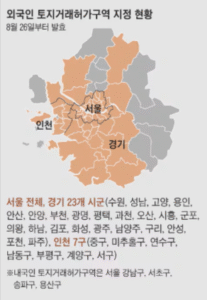
Investment Sources and Business Site Requirements, Key Conditions for a Successful D8 Visa
As Korea’s economy grows and K-POP, K-DRAMA, and other aspects of Korean culture become globally popular, the demand for the D8 Investor Visa among foreigners wishing to stay in Korea is increasing. Especially, foreigners who find it difficult to secure professional employment or permanent residency are inclined to prefer the D8 visa, which requires a relatively small investment. Many international students who have completed their studies in Korea also look into the D8 visa to continue staying in the country.
Check out the previous post!
[Korea Visa #1] Understanding Korean Visas Made Easy: The Ultimate Guide for Foreigners
[Korea Visa #2] Studying in Korea is Impossible Without This Visa! Essential Information for International Students
[Korea Visa #3-1] Succeeding in Professional Employment in Korea with the E-7 Visa Basic Principles and Key Occupations
[Korea Visa #3-2] How to Successfully Secure Professional Employment in Korea with the E-7 Visa: A Complete Guide to Eligibility Requirements and Essential Documents
There are three main ways for foreigners to invest in Korea
- Medium to large corporations typically use the D7 visa for expatriates.
- Individual business owners investing less than 300 million KRW usually obtain the D8 Corporate (Business) Investment Visa.
- For those investing over 300 million KRW, the D9 Trading Management Visa is applicable.
Four Types of D8 Corporate (Business) Investment Visas
The D8 Investor Visa has four types. The most common types in practice are D-8-1 and D-8-3.
D-8-1 (Corporate Investment)
This visa is for individuals who have invested over 100 million KRW in a foreign-invested corporation in Korea. The investment must be at least 100 million KRW, and the investor must own 10% or more of the total voting shares of the corporation.
D-8-2 (Venture Investment)
This visa is for individuals who have established (or are in the process of establishing) a venture company with excellent technical skills, possessing intellectual property rights or having their venture status confirmed. The visa is available to the representative of the company or an individual deemed to have high technical capabilities.
D-8-3 (Partnership in a Private Business)
This visa is for those investing in a business run by a Korean national. The investment must be over 100 million KRW, and the investor must own 10% or more of the total investment in the business. The Korean partner’s capital must also exceed 100 million KRW.
D-8-4 (Tech Start-up)
This visa is for individuals who have obtained at least an associate degree from a Korean institution or a bachelor’s degree from abroad, or those recommended by a central government official. Applicants must hold intellectual property rights or have equivalent technological skills and have established a corporation. The visa can be issued conditionally for six months if the corporation is not yet fully established.
Key Review Factors for Korea’s Immigration Office

1. Investment of 100 million KRW or more in a foreign-invested corporation
For “Corporate Investment (D-8-1)” and “Private Business Investment (D-8-3),” the investment must exceed 100 million KRW, and the company must be recognized as a foreign-invested enterprise under the Foreign Investment Promotion Act. The number of employees allowed is generally limited to one per 100 million KRW investment.
Additional allowances may be granted for a foreign-invested company’s annual tax records, employment of three or more Korean nationals for six months, annual sales of 1 billion KRW, or domestic facility investments totaling 1 billion KRW.
2. No Criminal Records
The visa will only be issued if the applicant has no major criminal offenses, either domestically or internationally.
3. Proof of Investment Sources
The proof of investment source is one of the most stringent requirements for D8 visas. The funds must come from the applicant’s own assets, and funds from parents or third parties, or domestic funds in Korea, are not accepted. However, funds from a spouse or minor children are exceptions. For investments over 300 million KRW, funds from the investor’s parents are also accepted.
In cases of proxy remittance, applicants must submit:
- A letter explaining the need for proxy remittance (such as specific circumstances in the home country)
- A bank-issued remittance confirmation clearly stating that the proxy is transferring the funds on behalf of the investor.
Funds transferred from a third country or brought in as cash will only be accepted if detailed proof of the original investment source is provided.
4. Verification of Independent Business Site
Documents such as a lease agreement, transaction records, utility payments, and maintenance fees are used to verify the existence and actual operation of the independent business site. Short-term leases (less than six months), residential leases, and online-only businesses are generally not accepted, though exceptions may be made under certain circumstances.
5. Essential Expertise Required for D8-1 and D8-3
For “Corporate Investment (D-8-1)” and “Private Business Investment (D-8-3),” applicants must have highly specialized and exclusive experience and knowledge that is difficult to replace within Korea. Essential expertise includes roles such as executives, senior managers, and professionals.
6. Review of Partner’s Investment for D-8-3
For “Private Business Investment (D-8-3),” the Korean partner’s capital must exceed 100 million KRW and will be reviewed separately.
7. Strict Review for Small Investments Under 300 million KRW
For individual investors with less than 300 million KRW, the source of funds and investment capital will undergo more rigorous scrutiny.
Changing Visa Status to D-8-1 Within Korea
Foreign residents who meet the requirements for the D8 Investment Visa can apply for a change in visa status while in Korea. However, certain visa types, including D-3, E-9, E-10, G-1, H-1, and H-2, cannot be changed within the country, requiring the applicant to return to their home country for a new visa application.
Required Documents
- Passport, Alien Registration Card (if applicable), Visa Application Form, 1 standard photo
- Proof of Residence
- Copy of Business Registration, Full Corporate Registration Certificate, and Stock Ownership Details
- Copy of Foreign-Invested Company Registration
- Official Transfer Order and Employment Certificate (for expatriates)
- Tuberculosis Diagnosis (if applicable)
- Foreigner Employment Report
- Proof of Investment Funds
- Additional documents for investors with less than 300 million KRW
- Office Lease Agreement, Business Performance Reports
Conclusion
Help Plus Administrative Attorney provides a three-step process for obtaining the D8 Investment Visa:
- Opening a foreign currency account for foreign-invested companies
- Establishing the foreign-invested corporation
- Transferring or bringing in funds from abroad
In the next post, we’ll explain this three-step process in detail. For any visa-related inquiries, feel free to contact us.
- https://blog.naver.com/celloberlin
- Kakao : phdcelloberlin
- Whatsapp : + 82 10-3174-3793
- celloberlin@naver.com









